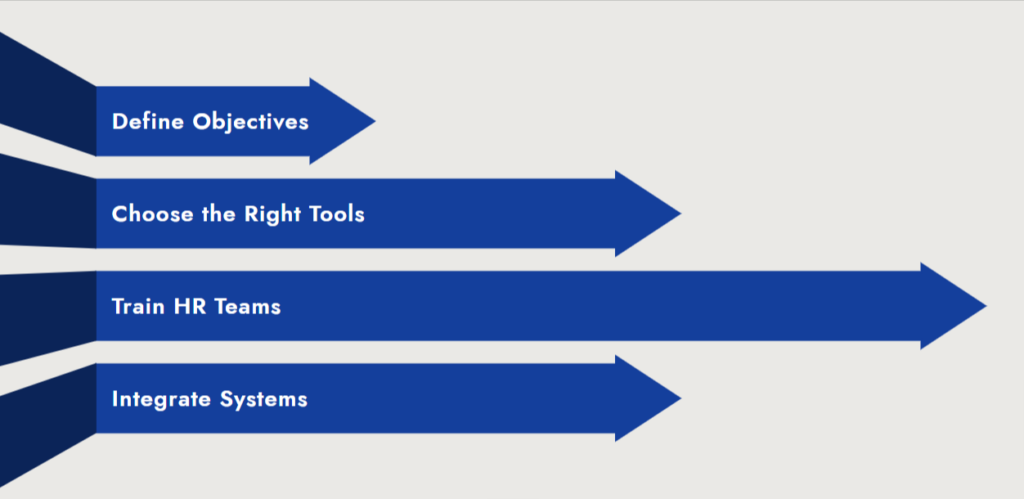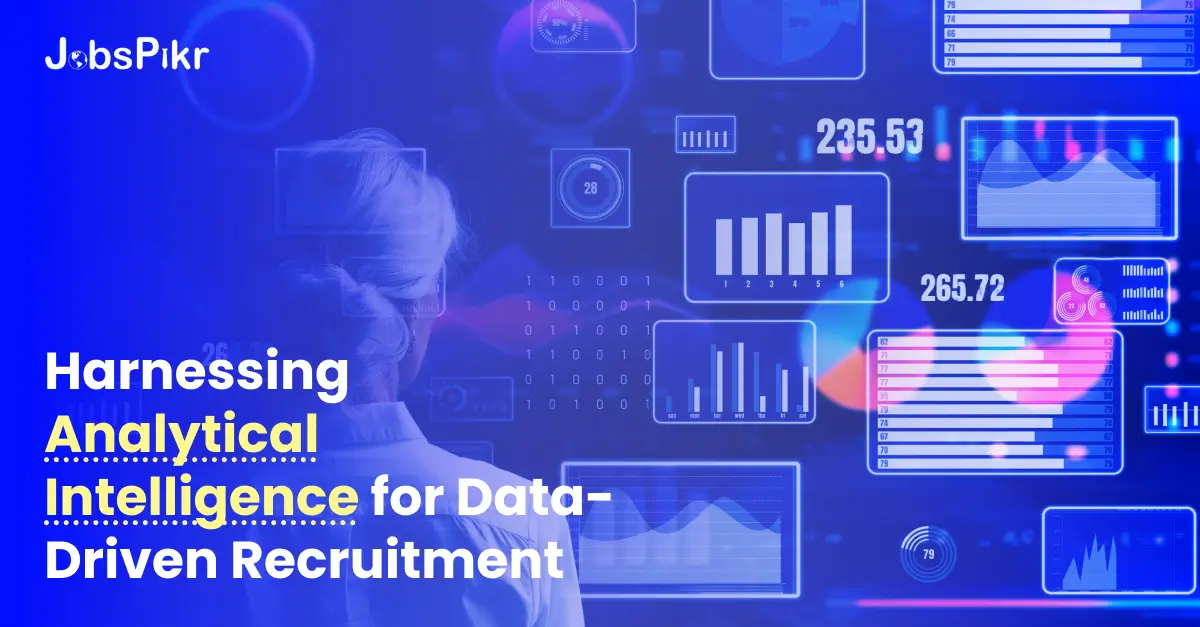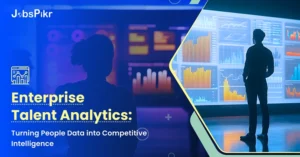In the ever-evolving landscape of recruitment, analytical intelligence has emerged as a transformative tool, enabling organizations to make data-driven hiring decisions. By leveraging recruiting analytics, talent acquisition teams can not only identify the best candidates but also optimize every stage of the hiring process. This article delves into the role of analytical intelligence in recruitment, exploring strategies and benefits that empower HR professionals to align hiring practices with organizational goals.
What is Analytical Intelligence in Recruitment?

Analytical intelligence in recruitment refers to the ability to collect, process, and interpret data to make informed hiring decisions. It goes beyond traditional recruitment methods by using advanced data intelligence tools and techniques to:
- Analyze candidate qualifications and fit based on historical data.
- Identify trends in recruitment performance and outcomes.
- Predict future hiring needs and workforce demands.
Recruiting analytics serves as the backbone of analytical intelligence, offering actionable insights into talent acquisition strategies. With the integration of data intelligence, organizations can reduce biases, streamline processes, and achieve higher retention rates.
Why Data-Driven Recruitment is Essential for Modern Organizations?
The shift towards data-driven recruitment has reshaped how companies approach talent acquisition. Analytical intelligence provides the foundation for this shift, offering HR professionals the ability to:
- Enhance Candidate Sourcing: By analyzing data from various platforms, recruiters can identify the most effective channels for sourcing candidates, reducing time-to-hire.
- Improve Candidate Screening: Analytical tools use algorithms to assess resumes and match qualifications with job requirements, ensuring that only the most suitable candidates progress.
- Optimize Interview Processes: Data intelligence can identify patterns in successful interviews, helping recruiters refine questions and evaluation metrics.
- Forecast Hiring Trends: Predictive analytics helps organizations anticipate future workforce needs, enabling proactive recruitment planning.
- Personalize Recruitment Campaigns: Analytical intelligence allows for tailoring outreach strategies based on candidate preferences and behaviors, improving engagement.
How Analytical Intelligence Can Drive Strategic Decisions?
To harness the full potential of analytical intelligence, organizations should implement the following strategies:
1. Invest in Advanced Recruiting Analytics Tools
Modern recruiting analytics platforms offer capabilities such as predictive modeling, real-time dashboards, and AI-driven candidate matching. Tools like these allow HR professionals to gather and analyze vast amounts of data, turning raw information into actionable insights. These platforms simplify complex data processes, enabling recruitment teams to focus on strategic decision-making and fostering better candidate relationships.
2. Establish Clear Metrics for Success
Defining key performance indicators (KPIs) such as time-to-fill, cost-per-hire, and quality-of-hire enables organizations to measure the effectiveness of their recruitment strategies. Analytical intelligence ensures these metrics are backed by reliable data, helping recruiters identify areas for improvement. Regularly tracking these metrics provides actionable insights for refining the hiring process.
3. Foster Collaboration Between HR and Data Teams
Collaboration between HR professionals and data scientists enhances the implementation of analytical intelligence. Data teams can assist in developing models and interpreting complex datasets, ensuring recruitment strategies are data-driven and precise. By integrating their expertise, HR teams can utilize advanced tools more effectively and align hiring practices with broader organizational goals.
4. Utilize Workforce Data Intelligence
By analyzing workforce data, organizations can uncover critical insights into employee skill shortages, identify trends in attrition rates, and understand workforce dynamics to better align recruitment initiatives with broader business goals. For example, a study by Deloitte found that companies leveraging workforce analytics achieved a 25% improvement in talent acquisition efficiency, showcasing the tangible benefits of data-driven recruitment strategies. Additionally, these analytics allow for a proactive approach in workforce planning, helping businesses stay ahead in competitive markets. Workforce data intelligence also supports strategic workforce planning. This approach not only enhances recruitment outcomes but also provides actionable insights to improve workforce retention and development.
5. Implement Continuous Learning and Adaptation
Recruitment is a dynamic process that demands regular assessment and adaptation. For instance, companies like Amazon consistently update their recruiting analytics to identify inefficiencies and uncover new opportunities, enabling them to stay ahead in acquiring top talent. By continuously refining strategies based on real-time insights, organizations can not only stay competitive but also ensure alignment with ever-changing industry demands and workforce expectations. Emphasizing continuous improvement ensures that recruitment practices remain relevant and effective in addressing market challenges.
6. Prioritize Candidate Feedback Integration
Using data intelligence, organizations can analyze feedback from candidates to enhance the recruitment experience. This helps in building a positive employer brand and improving engagement rates. Positive candidate experiences are increasingly important in a competitive job market, and analytical tools help refine these experiences based on measurable data.
What are the Key Benefits of Analytical Intelligence in Modern Recruitment?
The integration of analytical intelligence into recruitment processes offers numerous advantages:
- Enhanced Decision-Making: Data-driven insights lead to more informed and objective hiring decisions.
- Increased Efficiency: Automated processes reduce the time and resources required for recruitment.
- Improved Candidate Experience: Personalized and efficient hiring practices enhance the experience for applicants.
- Higher Retention Rates: By selecting candidates who are a better fit for roles, organizations can reduce turnover.
- Scalable Solutions: Analytical intelligence supports recruitment efforts as organizations grow, ensuring scalability and adaptability.
- Better Diversity and Inclusion: By analyzing hiring patterns and outcomes, organizations can identify biases and develop strategies to promote diversity.
Case Studies: Success Stories in Data-Driven Recruitment

Tech Industry
A leading tech firm used recruiting analytics to streamline its hiring process for software engineers. By implementing tools like AI-powered applicant tracking systems and analyzing past hiring data, the company identified the most effective recruitment channels and optimized job postings. This approach resulted in the hiring of 500 engineers within six months, with a 35% improvement in retention rates. By analyzing historical data, they identified key traits associated with successful employees and adjusted their candidate screening accordingly. This resulted in a 30% improvement in hire quality and a 20% reduction in time-to-fill.
Healthcare Sector
A healthcare organization leveraged analytical intelligence to address a critical shortage of specialized nurses, implementing predictive analytics tools to identify regions with high availability of qualified talent. By focusing their recruitment efforts on these areas, they successfully hired 150 nurses within six months, reducing hiring costs by 25% and filling positions 30% faster than traditional methods. By utilizing predictive analytics, they identified regions with high talent availability and targeted their recruitment campaigns. This approach reduced hiring costs by 25% and filled critical positions faster.
Retail Industry
A global retail chain used workforce data intelligence to anticipate seasonal hiring needs. By analyzing historical hiring data, they optimized recruitment campaigns, ensuring adequate staffing during peak seasons without over-hiring. For instance, a leading retailer implemented this strategy and observed a 20% reduction in overstaffing during non-peak months, which led to a 15% decrease in overall staffing costs. This data-driven approach not only improved efficiency but also ensured customer satisfaction during high-demand periods. This strategy improved operational efficiency and reduced staffing costs.
Financial Services
A financial institution employed data intelligence to assess the performance of their recruitment strategies. They discovered inefficiencies in sourcing methods and reallocated resources to high-performing channels, improving candidate quality and lowering costs.
How to Transform Recruitment with an Analytical Intelligence Roadmap?

To successfully adopt analytical intelligence in recruitment, organizations should follow this roadmap:
1. Define Objectives: Identify specific goals for integrating data intelligence into recruitment processes, such as improving candidate quality or reducing turnover.
2. Choose the Right Tools: Select recruiting analytics platforms that align with organizational needs and offer scalability.
3. Train HR Teams: Equip HR professionals with the skills needed to interpret data and use analytical tools effectively.
4. Integrate Systems: Ensure seamless integration between recruiting analytics platforms and existing HR systems to facilitate data sharing.
5. Monitor and Refine: Continuously evaluate the effectiveness of analytical intelligence strategies and make adjustments as needed.
6. Ensure Data Security and Compliance: Implement robust data security measures and ensure compliance with relevant regulations to protect candidate and organizational data.
Conclusion
Analytical intelligence is revolutionizing recruitment, offering organizations the ability to make data-driven decisions that enhance hiring outcomes. By leveraging recruiting analytics and workforce data intelligence, companies can identify the best candidates, optimize recruitment processes, and align hiring practices with business objectives.For talent acquisition teams and HR analytics professionals, the future of recruitment lies in analytical intelligence. By adopting these strategies and tools, organizations can stay ahead in the competitive talent landscape. Start exploring the power of analytical intelligence by signing up on JobsPikr and transforming your recruitment strategy today.



